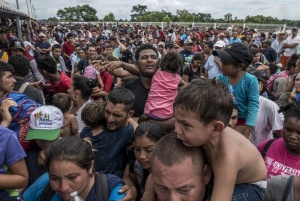
-Editorial
Before the arrival of a large number of Honduran immigrants to the border cities of Baja California, Mexicali and Tijuana, who are part of the group of more than 7,000 people who have traveled the approximately 2267 miles between the Honduran border and the U.S. border with Baja California, many Baja Californians have shown their disgust and rejection for the social implications that this large number of migrants can bring to Mexican society.
Ironically, the popular Mexican rhetoric sounds very similar to the speeches of the current president of the United States, such as the one he used in the campaign when he mentioned that Mexico was not sending their best of their people and that although some were good, most of them were traffickers and rapists, as well as a threat to American society.
Mexicans are being confronted by contradictions. Some complain openly that the Mexican government is doing everything possible to provide them from medical attention to water and shelter where they can be safe temporarily and then continue on their way. They argue that how is it possible to support people who were not born in that country and that if such a resource were available it should be assigned to ethnic groups and indigenous communities who have great needs that have not yet been met.
The Mexican country is confronted by its contradictions before the notion that in the new political times that we live they should have another attitude to the challenge of migration, perhaps more congruent and more humanitarian. However, it is being hampered by selfishness and strong pressures exerted from Washington, D.C. which are full of hatred, racism, and lack of understanding.
In open, paid, portable and mobile television, millions of people have followed in real time events that receive the most varied interpretations. Some have seen a crowd determined to overcome any obstacle, legions singing the Honduran national anthem who are motivated to pass by force, to organizers who arrange that women and children go in the front, leaders summoning to overcome by force the Mexican police, to men declaring that they have nothing to negotiate, that they will cross. It is precisely this movement which feeds the fear of invasion, as it is believed in the United States of Mexicans.
Others observe poor families and individuals dragging as little as they were able to bring with them. Babies and old women who are hardly rescued from the trampling when they fall between the demolished rails. To mothers who tell how their children were brutally murdered because of insecurity. To young people who tell how violence and poverty have left them no choice but to leave. To teenagers who tell what they have heard that it can be a hopeful future in the United States. That they will cross. From that grows the empathy and understanding of many.
Many Mexicans agree with the idea that the United States treats Mexican migrants unfairly, while Hondurans expect to receive some mercy and political asylum, however, there is a debate in which we hear many people’s comments charged with racism and contempt in Mexicans demanding immediate expulsion and the return of Hondurans to Central America, as well as multiple qualifying adjectives where Hondurans are described as ignorant, lazy, troublemakers, dirty, murderers and the worst people there might be.
Although the migratory phenomenon has always happened, there are those who say that this caravan was an organized plan for political and partisan purposes, since according to some members of the caravan, they were financed for buses and food on their way to the United States.
And while temporary shelters, medical care, food and resources, are limited for such a large number of migrants already located in the state of Baja California, we wonder what leads so many people to risk it all to reach a dream and arrive to the Promised Land, where they say they would find peace and prosperity for themselves and their families?


